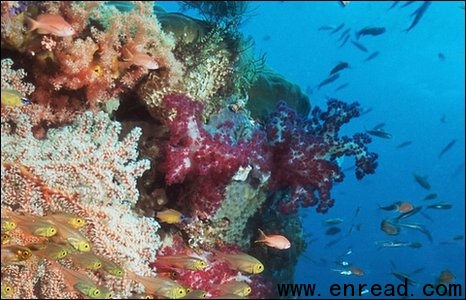| ||||||||||||||||||||||||||||||||||||||||||||||||||||||||||||||||||||||||
|
Coral reefs give rise to many more new species than other tropical marine1 habitats, according to a new study. 一项新研究显示,珊瑚礁比其它热带海洋栖息地容易产生更多的新物种。  The reefs are centres of evolution as well as biodiversity Scientists used fossil化石 records stretching back 540 million years to work out the evolution rate at reefs群礁,礁石. They report in the journal Science that new species originate 50% faster in coral reefs than in other habitats. The team says its findings show that the loss of these evolution hotspots could mean "losing an opportunity to create new species" in the future. Coral reefs harbour a huge number of marine species - they are often likened比作,比拟 to rainforests in terms of依据,按照 their biodiversity. But they also provide a "pump of new marine species", according to Wolfgang Kiessling the scientist from Humboldt University in Berlin, Germany, who led this study. He and his colleagues examined the fossil record to find the earliest evidence of benthic水底的 creatures - animals that live on the seafloor. These creatures provide a good record of evolution. They remain on the seafloor once they die, and are often fossilised along with some of the remains2 of their original habitats. This team of scientists looked for the earliest fossils from each benthic genus类,种,属, or group of species, in the fossil record. "We checked when and where each genus first occurred, explained Dr Kiessling. "So for example, if the earliest fossils were 300 million years, we asked: 'Did it occur in a reef or outside'." He and his colleagues had access to a record stretching back to the Cambrian寒武纪 explosion - when the vast majority of complex organisms are believed to have emerged more than 540 million years ago. This huge data set was compiled by an international project called the Paleobiology古生物学 Database, which was started in 2000. "We had the best documentation of the fossil record at our fingertips," Dr Kiessling told BBC News. "And there was also the geological context there, so we knew where each species occurred. "Our study shows that reefs are even more important than currently assumed. They are not only ecologically important for the marine environment, but also in an evolutionary3 sense." But Dr Brian Rosen, a zoologist4 at the Natural History Museum in London, UK, warned that the accuracy of fossil records alone was "notoriously众所周知地 difficult to gauge5估计,测量 from the literature". He added that it could be useful for independent experts to re-examine some of the fossilised creatures. Data "generated by direct examination of the specimens6 themselves by the relevant taxonomic分类的 specialists" is more reliable when it comes to working out important evolutionary patterns, he said. Carl-Gustaf Lundin, head of the marine programme at the International Union for Conservation of Nature国际自然保护联盟 (IUCN) said that this was a "very welcome paper". "Studies like this provide conclusive7 evidence决定性证据 that reefs are centres of marine biodiversity," he told BBC News. "And now we see their importance in the evolutionary history of the planet." He added that currently the planet was losing 2% of its reefs each year, mainly because of increasing ocean temperature bleaching漂白 and stunting9阻碍 the coral's growth. And ocean acidification酸化 making it more difficult for corals to build their skeletons. Dr Kiessling said: "If we lose reefs we lose [an] opportunity to create new species by evolutionary processes." 点击  收听单词发音 收听单词发音
|
||||||||||||||||||||||||||||||||||||||||||||||||||||||||||||||||||||||||
- 发表评论
-
- 最新评论 进入详细评论页>>



